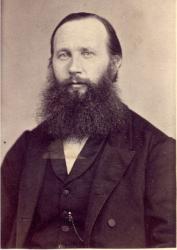1635 - 1699 Person Name: Godfred Sacer Topics: Twenty second Sunday after Trinity Sunday Author of "Den Idræt Gud er tækkelig" in Salmebog for Lutherske Kristne i Amerika Sacer, Gottfried Wilhelm, son of Andreas Sacer, senior burgomaster of Naumburg, in Saxony, was born atNaumburg, July 11, 1635. He entered the University of Jena in 1653, and remained there for four years as a student of law. He was thereafter for two years secretary to Geheimrath von Platen, in Berlin; and then tutor, first to a son of the Swedish Regierungsrath von Pohlen, and then to the sons of the Saxon Landhauptmann von Bünau. In 1665 he entered the military service under Herr von Mollison, commandant at Lüneberg, at first as regimental secretary, and afterwards as ensign. Soon tiring of this he went to Kiel in 1667, in order to graduate LL.D., but before doing so undertook a tour in Holland and Denmark with some young noblemen from Holstein. In 1670 he settled down as advocate at the appeal and chancery courts in Brunswick (graduating LL.D. at Kiel in 1671), and in 1683 removed to Wolfenbüttel as Kammer-und Amts-advocat, receiving the title of Kammer-Consulent in 1690. He died at Wolfenbüttel, Sept. 8 [18], 1699. (Weizel, iii. p. i.; Koch, iii. 398, iv. 562, &c.)
Sacer began early to write poetry, was admitted by Rist, in 1660, as one of his poetical order of Elbe Swans, and in hisNützliche Erinnerungen wegen der teutschen Poeterey, Altenstettin, 1661 [Wolfenbüttel Library], already described himself as " Kayserlicher Poët," i.e. as having been crowned as a poet by the Emperor of Austria. His hymns are among the best of the period immediately succeeding Gerhardt. They have a considerable measure of poetic glow, and sometimes of dramatic force, and are Scriptural and good in style. His earliest hymns seem to have appeared in hisBluttriefende, siegende und triumphirende Jesus, 1661, but no copy of this work is now known. Many are included in pt. ii. 1665, of the Stralsund Gesang-Buch (Ander Theil des erneuerten Gesang-Buchs), and in the other hymn-books of the period. They were collected and published by his son-in-law as his Geistliche, liebliche Lieder, at Gotha, 1714.
Those of Sacer's hymns which have passed into English are:—
i. Durch Trauera und durch Plagen. New Year. Included in 1665 as above, pt. ii. p. 35, in 7 stanzas of 8 lines; repeated 1714, p. 3, entitled "On the New Year." It is also in the Berlin Geistliche Lieder ed. 1863, No. 191. The translation in common use is:—
Through many changeful morrows. This is a good tr. by Dr. F. W. Gotch, in the Baptist Magazine, Jan. 1857, p. 19, repeated in the 1880 Supplement to the Baptist Psalms & Hymns.
ii. Gott fähret auf gen Himmel. Ascension. Founded on Ps. xlvii. 6-7. Included in 1665, as above, pt. ii. p. 147, in 7 st. of 8 1., and repeated 1714, p. 27, entitled "On the Ascension of Christ." It is also in the Berlin Geistliche Lieder, ed. 1863, No. 336. In the Württemberg Gesang-Buch, 1842, it begins, "Der Herr faint auf." The translations in common use are:—
1. Lo! God to heaven ascendeth. This is a good tr., omitting st. vi., by Miss Cox, in her Sacred Hymns from the German, 1841, p. 39 (Hymns from the German, 1864, p. 63). Repeated, abridged, in Alford's Psalms & Hymns, 1844, and his Year of Praise, 1867; in Dale's English Hymn Book, 1874, &c.
2. While up to Heaven God goeth. A spirited version, omitting st. vi., by W. J. Blew, printed as a leaflet for choir use in 1846, and included in his Church Hymn & Tune Book, 1852 ; in Rice's Selection from Blew, 1870, No. 67, and in Lyra Messianica, 1864, p. 3fr2.
Other hymns by Sacer are:—
iii. Gott, der du aller Himmel Heer. For those at Sea. Included in J. Crülger's Erneuerte Gesangbüchlein ...von Peter Sohren , Frankfurt am Main, 1670, No. 878, in 10 st., and repeated, 1714, p. 75, in 11 St., entitled “Hymn for Seafarers." Recently in Knapp's Evangelischer Lieder-Schatz 1837 and 1865. Translated as, "Thou who hast stretched the heaven's blue sky." In L. Rehfuess's Church at Sea, 1868, p. 34.
iv. Lass mich nicht in Irrthum fallen. Christ for all. Included, 1714, as above, p. 53, in 10 st. of 8 1., founded on Ps. li. 13, and repeated in the Hannover Gesang-Buch, 1740, No. 848. Tr. as "Lord, forbid that e'er such error." By Dr. J. Guthrie, 1869, p. 117.
v. 0 dass ich könnte Thränen gnug vergiessen. Passiontide. Included in 1665 as above, pt. ii. p. 60, in 16 st. of 4 1., and repeated, 1714, p. 20, entitled "Contemplation of the piteous death of Jesus Christ." In the Berlin Gesang-Buch, 1829, st. xiv.-xvi. altered and beginning, “Mein Herr und Heiland, lass mirs gehn zu Herzen," are included as No. 189. This form is tr. as, “Lord, touch my heart with that great Consummation," by N. L. Frothingham, 1870, p. 143.
vi. So hab' ich obgesieget. Funeral of a Child. Included in 1665 as above, pt. ii. p. 665, in 13 st. of 8 1., st. i.-xii. being given as spoken by the child in Paradise, and xiii. as the answer of the bereaved parents. Re¬peated,in 1714, p. 91, entitled "Comfort from the de¬parted to those left behind," the 13th stanza being entitled “Farewell of the sorrowing ones." Recently as No. 855 in the Evangelischer Lieder-Schatz, 1851. Translated as (1) "Lo! now the victory's gain'd me," by Miss Cox, 1841, p. 77. In her edition of 1864, p. 87, it is altered and begins, "My race is now completed." (2) "Then I have conquer'd; then at last," by Miss Winkworth, 1855, p. 243. (3) "My course is run; in glory," by Dr. J. Guthrie, 1869, p. 105. [Rev. James Mearns, M.A.]
--John Julian, Dictionary of Hymnology (1907)
Gottfried Wilhelm Sacer






